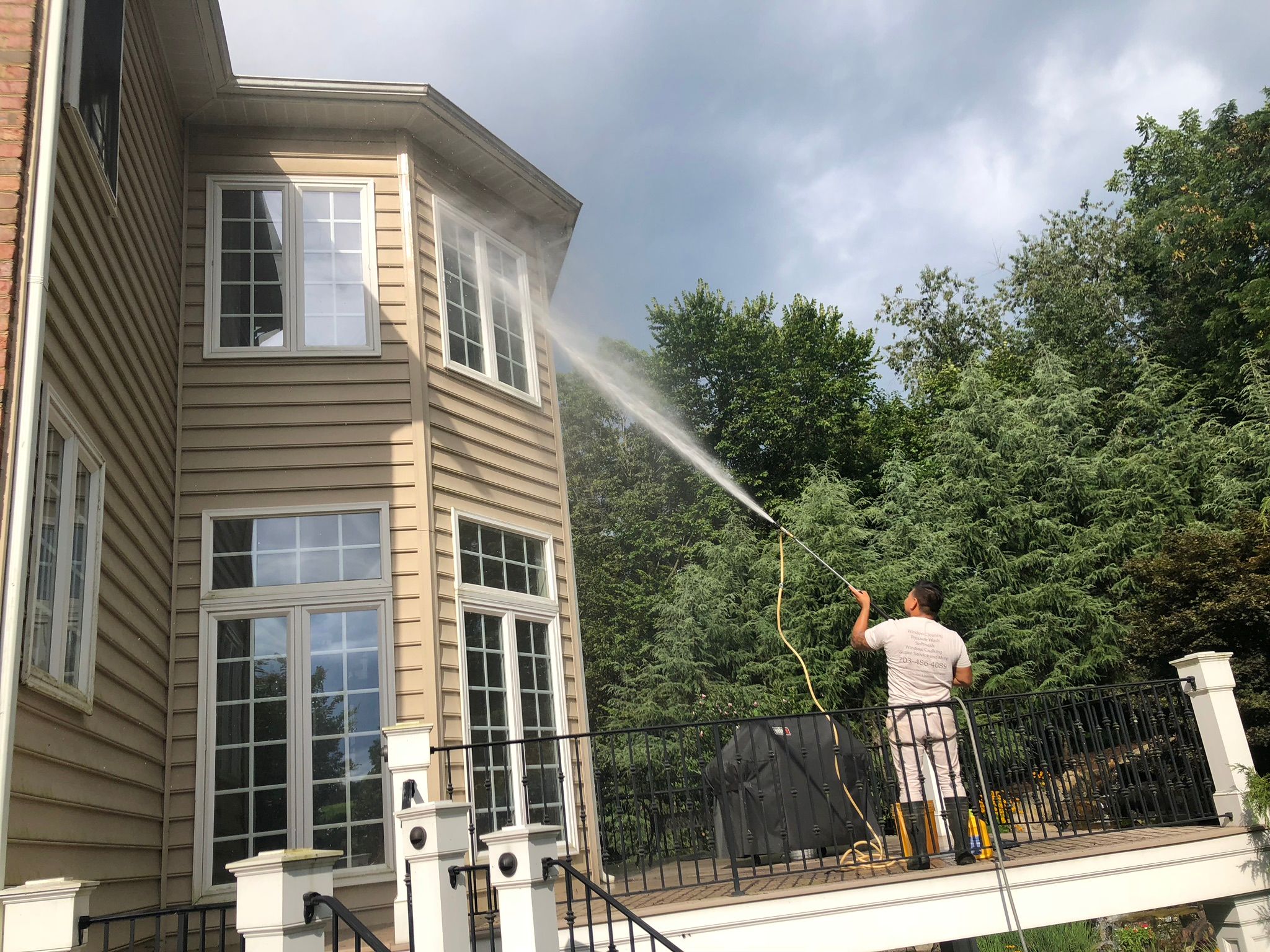
Two common methods stand out when cleaning the exterior of your home, driveway, or commercial property. power washing and soft washing. While they might seem similar at first glance, these techniques have distinct differences in terms of pressure, cleaning solutions, and applications. Understanding the differences between power washing vs soft washing can help you choose the right method for your cleaning needs, ensuring effective results without causing damage.
What Is Power Washing?
Power or pressure washing uses high-pressure water to remove dirt, grime, mold, mildew, and other pollutants from surfaces. The water is typically heated, making it more effective at breaking down stubborn stains and grease.
Key Characteristics of Power Washing:
- High Pressure: Typically ranges between 1,500 to 4,000 PSI (pounds per square inch), making it best for hard cleaning jobs.
- Heated Water: Some power washers use heated water, which helps dissolve oil, grease, and other stubborn stains.
- Best for Hard Surfaces: It works well on concrete driveways, sidewalks, patios, and brick exteriors.
When to Use Power Washing
Power washing is best for surfaces that can withstand high-pressure water, such as:
- Driveways and sidewalks
- Brick and stone patios
- Parking lots
- Heavy-duty commercial cleaning
Since power washing can be intense, it is not recommended for delicate materials like wood, siding, or roofing shingles, as it may cause damage.
What Is Soft Washing?
Soft washing is a low-pressure method that uses specialized cleaning solutions to break down dirt, mold, algae, and other contaminants. Unlike power washing, which relies on pressure, soft washing depends on chemical agents for cleaning.
Key Characteristics of Soft Washing:
- Low Pressure: Uses less than 500 PSI, preventing damage to delicate surfaces.
- Cleaning Solutions: A mix of biodegradable chemicals breaks down grime, mold, and mildew.
- Longer-Lasting Results: Since soft washing kills mold and bacteria at the root, surfaces tend to stay cleaner for longer.
When to Use Soft Washing
Soft washing is best for delicate surfaces, including:
- Roofs (asphalt shingles, tile, metal)
- Vinyl, wood, and stucco siding
- Decks and fences
- Outdoor furniture
Soft washing is particularly beneficial for residential properties, providing a gentle yet effective cleaning solution without risking structural damage.
Power Washing vs Soft Washing: Which One Should You Choose?
The choice between power and soft washing depends on the type of surface and the level of cleaning required. Here’s a breakdown of how they compare:
- Pressure Level: Power washing operates at high pressure (1,500–4,000 PSI), while soft washing uses much lower pressure (below 500 PSI).
- Water Temperature: Power washing often uses hot water, which helps remove tough grime and grease. On the other hand, soft washing uses cold water combined with cleaning solutions.
- Cleaning Method: Power washing relies on forceful water pressure to remove dirt, while soft washing uses chemical solutions to break down contaminants before a gentle rinse.
- Best Uses: Power washing is ideal for concrete, brick, and other hard surfaces. Soft washing is best for delicate materials like roofs, siding, and wooden decks.
- Risk of Damage: Power washing can cause damage to fragile surfaces, whereas soft washing is a safer option for sensitive areas.
- Longevity of Clean: Soft washing provides longer-lasting results because it kills mold and bacteria at the source, whereas power washing may only remove surface-level dirt.
Power washing might be the best option for a heavily soiled, durable surface. However, if you need to clean a more delicate surface, soft washing is the safer and more practical choice.
Benefits of Professional Cleaning Services
While DIY power washing and soft washing might seem appealing, hiring a professional service has several advantages:
- Proper Equipment: Professionals use commercial-grade equipment that ensures better results.
- Safety: High-pressure washing can be dangerous if not handled correctly. Professionals know how to manage the equipment safely.
- Expertise in Cleaning Solutions: Using the wrong chemicals can damage surfaces. Professionals know the right solutions for different materials.
- Time-Saving: Instead of spending hours figuring out how to clean your property properly, professionals can do the job efficiently.
- Prevention of Damage: Professionals understand the appropriate pressure levels and cleaning agents to use, reducing the risk of damage to your property.
A Better View’s Power Washing and Soft Washing Services
A Better View is your go-to expert for your power washing and soft washing needs, helping to restore your home’s exterior with professional, high-quality cleaning services. Whether your siding, driveway, deck, or roof needs a deep clean, their team uses advanced techniques and eco-friendly solutions to remove dirt, mold, mildew, and grime safely and effectively. Their soft washing method is perfect for delicate surfaces, ensuring a thorough clean without damage. With A Better View, you can trust that your home will look refreshed, well-maintained, and protected from the elements.
Conclusion
Power and soft washing are effective cleaning methods, but their applications differ significantly. Power washing is best for hard, durable surfaces that can handle high pressure, while soft washing is ideal for more delicate materials that require a gentler approach. If you’re unsure on what your home needs, contact A Better View today!